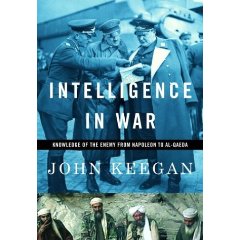Ivo H. Daalder
Newt Gingrich is right when he praises this book, and the international reviewers that give it 1-3 stars are also right when they point out that it is seriously incomplete and arguing from a very American point of view.
In my view, this book is essential reading together with the following four books, all of which I have favorably reviewed here at Amazon: first, Kristan Wheaton, The Warning Solution: Intelligent Analysis in the Age of Information Overload, Cees Wiebes, Intelligence and the War in Bosnia: 1992-1995 (Perspectives on Intelligence History), Wesley Clark, Waging Modern War: Bosnia, Kosovo, and the Future of Combat, and Eliot Cohen, Supreme Command: Soldiers, Statesmen, and Leadership in Wartime These four books cover what this book does not: 1) a full explanation of why “inconvenient warning” fails time and again; 2) a full explanation of the complete inadequacy of Western intelligence in relation to historical, cultural, and current indigenous intelligence as well as small arms interdiction in lower-tier unstable regions; 3) a useful itemization of the weaknesses of both NATO and the US military in responding to unconventional challenges in tough terrain distant from the center of Europe; and 4) how “supreme command” is most often exercised without regard to intelligence.
Having said that, let me enumerate what I regard as the very positive features of this book, one that makes it central to the discussion of NATO, Air Power, and US politics as they affect “engagement.”
First, the authors are to be commended for graciously but no less effectively nailing the Clinton Administration, and especially Sandy Berger, Madeline Albright, and William Cohen, for inattention and indecisiveness and a complete lack of any coherent sustainable strategy.
Second, although the author's do not stress this point beyond highlighting it in the opening sentence of the book, it comes across as a continuing theme: the entire conflict could have been resolved early on had the NATO allies had a capability to deal with *one man*, that is, Milosevic.
Third, the authors note clearly (on page 10) how there were many non-violent precursors to the violence and ensued, and that the Albanians finally concluded that only violence would get them international attention. This is a major theme within Jonathan Schell's utterly brilliant and comprehensive book, “The Unconquerable World” and one that any future Director of Central Intelligence must be held accountable for: warning in the *non-violent* stage.
Fourth, the author's, who between them have considerable expertise in defense analysis, indict the Clinton Administration for over-selling the peace negotiation efforts of Ambassador Holbrook, and the very bad campaign planning of General Clark.
Fifth, the author's document the pattern of Madame Secretary Albright, whose own book I recently reviewed along these lines, of rhetoric rather than reality–or words rather than actions with consequences. NATO bluffed while Madeline talked. Milosevic, no fool, understood all this. Albright is, however, credited with understanding that ultimately force would be needed to achieve the policy objectives.
Sixth, and this is something I learned the hard way in El Salvador, the author's very correctly make the point that such conflicts cannot be controlled with pressure on only one of the belligerents. *Both* parties to the conflict must be challenged and contained.
Seventh, the author's are helpful in pointing out that the Administration erred in failing to consider partition and independence as an option for the conflicted parties, and they emphasize that one must never under-estimate the will of any one party to achieve independence.
Eighth, and on the head of the Republicans we place this one, the authors point out that the impeachment proceedings against Bill Clinton because of his personal relations with Monica Lewinsky severely distracted and handicapped the Administration. Indeed, I recall that in all our Open Source Intelligence (OSINT) reports at the time, we had to modify all of our search strategies to include “and not Monica”, so over-whelming was the trash that would come up on Bosnia and other places we were looking at, all “hits” corrupted unless we excluded the Monica factor from US foreign policy. The lesson we take from this is that impeachment, especially frivolous impeachment, has major national security consequences, and is not merely a matter for domestic consumption or impact assessment.
The book is flawed, but not grievously, for failing to have any serious treatment of intelligence. There are just four over-lapping references to CIA, and to intelligence reports, in the entire book. In as much as this book is up to the norm for beltway policy books, we conclude that until such books have the deeper coverage and understanding of intelligence shortfalls as a matter of routine, intelligence and policy in Washington DC will continue to co-exist without reform and with a deliberate choice being made by policy experts to ignore intelligence and what intelligence, properly done, can bring to the process of peacemaking.
The author's final policy recommendation merit listing, and their elaboration is a highlight of the book:
1) Interventions should occur as early as possible
2) Coercive diplomacy requires a credible threat of force
3) When force is used, military means must relate to political ends
4) Airpower alone usually cannot stop the killing in civil wars
5) The Powell Doctrine for the use of force remains valid
6) Humanitarian interventions need realistic goals
7) Exit strategies are desirable but not always essential
8) Other countries need better, more deployable militaries
9) UN authorization for intervention is highly desirable, even if it is not required
10) Russia's support is valuable in these types of operations
11) NATO works well in peace and in war but only if US leads
12) An effective foreign policy requires that the president lead with confidence.
13) The US is not a hyperpower, but rather a superpower prone to *underachievement* instead of imperial ambition (this was pre-Bush and pre-neocon)
This book stands as the core reference on NATO and Kosovo, and as one of the more helpful references on principles of intervention and foreign policy that all future presidents and their staff can learn from.
Other more recent books I recommend, with reviews:
The Unconquerable World: Power, Nonviolence, and the Will of the People
The Sorrows of Empire: Militarism, Secrecy, and the End of the Republic (The American Empire Project)
Failed States: The Abuse of Power and the Assault on Democracy
Breaking the Real Axis of Evil: How to Oust the World's Last Dictators by 2025
Faith-Based Diplomacy: Trumping Realpolitik
War Is a Racket: The Anti-War Classic by America's Most Decorated General, Two Other Anti=Interventionist Tracts, and Photographs from the Horror of It











